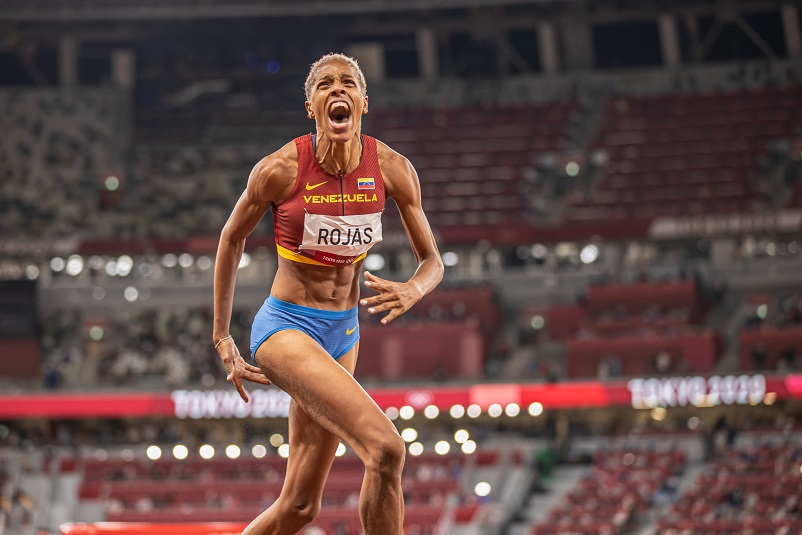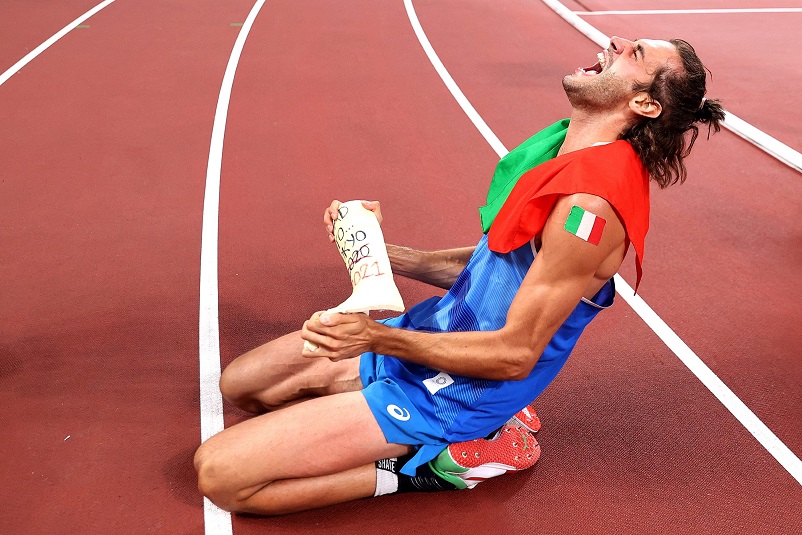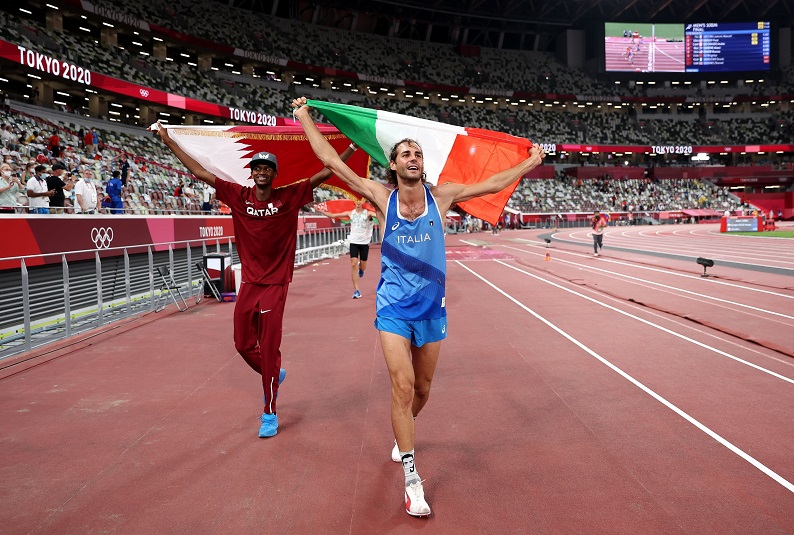 Even before the men’s 100m final, traditionally the most anticipated event of the Olympic Games, this was a thrilling night of athletics.
Even before the men’s 100m final, traditionally the most anticipated event of the Olympic Games, this was a thrilling night of athletics.
In the minutes before the world’s fastest men took to the track for their showdown on Sunday (1), Venezuela’s Yulimar Rojas had destroyed the 26-year-old triple jump world record with her last leap of the competition and brothers in flight Mutaz Barshim and Gianmarco Tamberi had tied for the high jump gold medal and agreed to share it, having supported each other as they recovered from the same career-threatening injury after the Rio Olympic Games.
But it was another Italian who pulled off the greatest upset of all. Lamont Marcell Jacobs arrived at the Tokyo Olympic Games in career best form but in nobody’s list of the top contenders to succeed Usain Bolt as the Olympic 100m champion, not even his own. His ambition went only as far as reaching the final.
However, almost the entire 100m field seemed gripped by nerves from the heats, perhaps mindful of the huge opportunity to claim the crown that Bolt had vacated. One by one, the leading contenders faltered. World leader Trayvon Bromell looked awful in his heat and never recovered, his US teammate Ronnie Baker ran a tight semifinal to undermine his chances and European champion Zharnel Hughes was disqualified for a false start in the final.
Through all the mayhem Jacobs just got better and better. The Italian had never broken 10 seconds before May this year, when he set a national record of 9.95. But he improved that mark to 9.94 to win his heat on Saturday, then set a European record of 9.84 in the semifinals to scrape into the final as one of two non-automatic qualifiers. He lifted again in the final to take the most coveted title of all with a second European record of 9.80.
Having made his name as an exceptional sprinter over 60m indoors, Jacobs used his superior start to take an early lead in the final and held his advantage to the line, holding off the converted 400m runner Fred Kerley (9.84) and Canadian Andre De Grasse (9.89).
A former eight-metre long jumper of Italian and American heritage, 26-year-old Jacobs only decided to pursue sprinting four years ago.
He was completely stunned by the outcome.
“I have no words,” he said.
“It’s a dream, it’s a dream, it’s fantastic. Tomorrow maybe I can believe it, but today it is incredible. My dream was to run in the final and I won. I don’t know what happened but I am very very happy.”
Rojas gets her goal
Emotions were high in the arena even before that finale. Rio Olympic silver medallist Rojas had stalked the world triple jump record of 15.50m for more than a year, having leapt 15.43m to set a world indoor record in Madrid in February last year and then matched that mark outdoors in May.
There seemed little doubt that she would break the long-standing record, the only question was when.
On her very first attempt tonight, she soared to 15.41m, agonisingly nine centimetres short of her goal. She mistimed her second jump, fouled her third, recorded 15.25m with her fourth and then had a second foul.
With just one attempt left, she channelled all her energy into the runway, hitting the take off board perfectly, holding her speed through the hop and step, then stretching out her long legs as she landed in the sandpit 15.67m later.
She exploded into joyous celebration, as did her coach, the great Cuban long jumper Ivan Pedroso. And as the realisation of her achievement hit her Rojas buried her head in the Venezuelan flag and sobbed.
“I can’t describe this feeling and this moment,” she said. “Gold medal winner, with an Olympic record, and a world record … Wow. It is a fantastic night.
“I was looking for it, I knew we had that distance in my legs to get it today. I was failing a bit in the technical aspect, but the last jump was one to give everything, and it was like that.”
Portugal’s Patricia Mamona was the only other athlete to clear 15 metres, winning the silver medal with a 15.01m national record, and Spain’s Ana Peleteiro (14.87m national record) completed the latin sweep of the medals.
 Shared success
Shared success
The men’s high jump had an equally intense denouement as great friends and rivals Barshim and Tamberi could not be separated on the mats. Both maintained identical clean sheets up to and including first-time clearances at 2.37m which left them locked together at the end of the competition.
They then agreed to share the gold medal rather than contest a jump off. Both men have been through the ringer over the last five years. Tamberi was in career-best form going into the Rio Olympics five years ago when he tore a ligament in his ankle and needed surgery that ruled him out of the Games.
Barshim won the silver medal in Rio but sustained the same ankle ligament injury in mid-2018 and was out of the sport for a year. However, he recovered in time to claim the world title in his hometown Doha in late 2019.
Tamberi’s recovery was slower but he took inspiration from Barshim’s comeback and now they will stand together on the medal podium.
“It’s unbelievable,” Barshim said. “If this is a dream, I don’t want to wake up.”
Tamberi, who used the cast from his injured ankle, inscribed with the words ‘Road to Tokyo 2020’ (crossed out for 2021) as the marker for his run up in the final, was even more emotional.
“After that injury, I said to myself if I want to come back I am coming back to win this competition and it happened,” he said.
Qualifying drama
If there is an event guaranteed to offer thrills and spills it is a hurdles race and the women’s 100m hurdles semifinals and men’s 400m hurdles semifinals featured both tonight.
Puerto Rico’s Jasmine Camacho-Quinn set a sizzling personal best and Olympic record time of 12.26 to lead the qualifiers in the sprint hurdles, equalling the fourth-best time in history and just 0.06 from Kendra Harrison’s world record.
A similar performance in tomorrow’s final will surely secure her the Olympic title although nothing is certain in a race as perilous as this. Jamaican Britany Anderson was the next fastest (12.40), ahead of Harrison (12.51).
In a prelude to Tuesday’s men’s 400m hurdles final, world record-holder Karsten Warholm and his US challenger Rai Benjamin met for the first time this year in the semifinals.
Benjamin (47.37) was leading coming off the final hurdle but Warholm (47.30) ensured that he was in front at the finish line. Both kept something back for the final.
Brazil’s Alison dos Santos (47.31) and Qatar’s Abderrahman Samba (47.47) were also impressive.
The men’s 800m almost lost one of the pre-race favourites in a tangle of legs on the final bend in the third semifinal.
Botswana’s 2012 Olympic silver medallist Nijel Amos and the USA’s Isaiah Jewett both hit the deck and had no time to recover and fight for a place in the final.
The two men then made an admirable gesture of sportsmanship, shaking hands, and walking away from the scene of their seemingly crushed dreams with their arms around each other.
Kenyan champion Ferguson Rotich went on to win the race in the fastest time of the round (1:44.04) and Amos was later advanced to the final by the referee.
Australian Peter Bol set his second Oceania and Australian record in as many days, clocking 1:44.11 in a controlled performance to win his semifinal from the USA’s Clayton Murphy, while the other semifinal also tossed up a surprise winner as Poland’s Patryk Dobek (1:44.60) crossed first, followed by Emmanuel Korir (1:44.74). – WORLD ATHLETICS

































